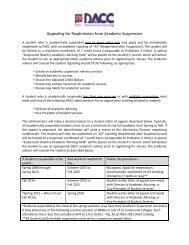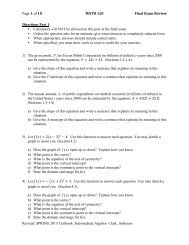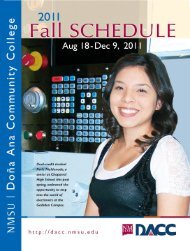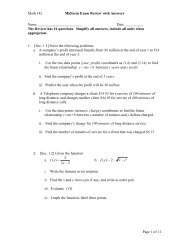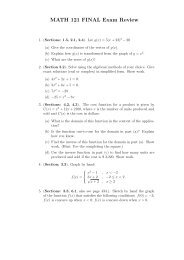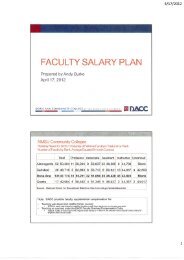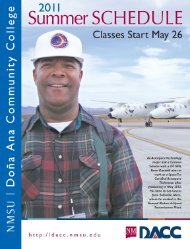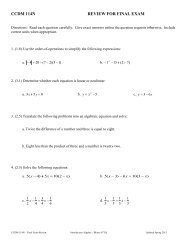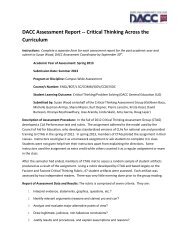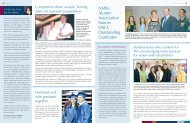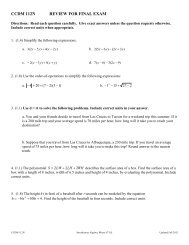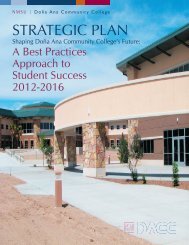DACC Catalog - Dona Ana Community College - New Mexico State ...
DACC Catalog - Dona Ana Community College - New Mexico State ...
DACC Catalog - Dona Ana Community College - New Mexico State ...
Create successful ePaper yourself
Turn your PDF publications into a flip-book with our unique Google optimized e-Paper software.
2012-2013 Student Handbook 127C. Reference to Other Policies Impacting Freedom of Expression. In the event thatthe terms of this policy conflict with other existing policies impacting freedom ofexpression in areas generally accessible to the public, the terms of this policy shallprevail.Fund Raising/Sales and SolicitationRaising funds is a means for campus organizations to supplement their other resourcesin meeting the goals of their organization. In order to avoid conflicts, duplications,or violation of laws or regulations, it is necessary to establish guidelines to aid incoordinating such activities.Although the University supports organizational fund-raising efforts, it recognizesthat the campus is not a market place to be exploited by opportune entrepreneurialprojects. Fund raising is not the primary function of student organizations, and campusorganizations do not have an implicit right to use the campus or the community forfund-raising activities.Fund raising through sales and solicitations, both on and off campus, are governed byUniversity Sales and Solicitation Policies. Full text copies of these policies are availablefrom the Campus Activities Office. The Director of Campus Activities is responsible forinterpreting the Sales and Solicitation Policy. The Campus Activities Office is locatedin Corbett Center Student Union, room 235.Dining RegulationsDining regulations are contained in the Dining Services contract, which each studentagrees to when applying for dining services. Additional copies are available in the IDCard Office. Upon reasonable notice and for good cause the University reserves theright to terminate the Dining Agreement for failure of the student to abide thereby.Examples of good cause include, but are not limited to, failure to abide by the termsof the Dining Agreement, a change in student status (including academic or disciplinarysuspension), or a failure to comply with the policies and regulations contained inthe Campus Dining Services program brochure and/or official informational bulletinsdistributed by Campus Dining Services which are thereby incorporated into Dining ServicesAgreement. Dining regulations are enforced under the Student Code of Conduct.Housing and Residential Life ApplicationAcceptance PolicyThe University reserves the right to refuse to give a housing assignment to any student.Examples of reasons for refusal include, but are not limited to, having a criminalhistory, behavioral problems which may, in the opinion of the University, negativelyimpact the group-living environment, previous eviction from campus housing, anda poor rental history.Housing and Residential Life RegulationsHousing regulations are contained in the Single Student Housing License Agreement,which each student agrees to when applying for housing services, as well as the“Housing and Residential Life Handbook,” which each student receives at move-in.Additional copies are available at the Housing Office and all residential area offices.Students living off campus are also subject to housing regulations when visiting residentialareas. Housing regulations are enforced through the Housing and ResidentialLife Office as well as through the Student Code of Conduct.Procedures for Entry and Search ofUniversity-Operated HousingThe University respects the student’s desire for privacy within the realm of the grouplivingexperience on state property and will make every effort to protect that privacy.Campus premises occupied by students and the personal possessions of students shallnot be searched unless appropriate authorization has been obtained. Campus livingquarters may be entered for the purposes and under the restrictions listed:A. Procedures for Entry1. Maintenance: Premises may be entered after knocking, to give attention to health,sanitation, maintenance, and safety requirements.2. Inspections: Housing personnel and any other appropriate university official(s) orstaff may enter any room/house/apartment for inspection purposes with appropriatewritten notice. Twenty-four hours’ notice will be given whenever possible.Housing personnel or any other appropriate university official conducting theinspection shall report violations of university regulations and state or federallaws via established procedures.3. Other:a. The University Housing staff may enter a room/house/apartment, after knocking,without written authorization when there exists immediate and compellingcause, e.g., loud noise, complaints from other residents, emergencycircumstances (such as fire evacuation), or similar overt occurrences. Evidenceof regulatory or statutory violations that exist in plain and open view of theentering staff members may be used in initiating disciplinary procedures.b. In instances where immediate and compelling cause does not exist, writtenauthorization from the individual in charge of the residential area or his superiormust be obtained prior to entry. Such authorization must show reasonablecause; i.e., there must exist a reason to believe, other than mere suspicion,that violations of federal and state statutes or university regulations are occurring.If the occupant of the room/house/apartment is absent, a staff member ofthe residential area must be present during the entry. Evidence of regulatoryor statutory violations that exist in plain and open view of the entering staffmember may be used in initiating disciplinary procedures.c. Police entrance shall be governed by the requirements of customary legalinvestigative practice.B. Procedures for Administrative Search. Upon presentation of reasonable cause,the Director of Housing and Residential Life or his/her superior may issue writtenauthorization for the search of a designated room/house/apartment and the contentsthereof. The authorization stating the reason(s), cause(s), or condition(s) necessitatingthe search shall be presented to the designated occupant(s) prior to the search.In execution of the search, the Director of Housing and Residential Life or his/herdesignee, the Coordinator for Residential Communities or his/her designee andthe occupant should be present; however, it is not imperative that the occupant bepresent.C. Appeal and Grievance Redress1. Entry and Search Authorization Appeals. In cases where disciplinary proceduresarise from evidence obtained on the basis of entry or search authorizations,the cause for, validity, or scope of the authorization may be challenged by thestudent-defendant and such challenge must be adjudicated by the Universitydisciplinary system before any further action is taken.2. Grievance Allegations. In such case that a student believes his/her guaranteedrights have been violated by an act of entrance or search, he/she may presentwritten allegation of this belief to the Vice President for Student Success who shallthereupon require an investigation of the allegation. Should this investigationdemonstrate that a University employee has intentionally erred and violated astudent’s rights, this employee shall be subject to disciplinary action, includingpossible termination.Nondescrimination PolicyThe University is dedicated to providing equal employment and educational opportunitiesto all persons without regard to age, ancestry, color, disability, gender, genderidentity, national origin, race, religion, sexual orientation, spousal affiliation, or veteranstatus. The University strives to comply with all federal and state nondiscriminationlaws, including:• Titles VI and VII, Civil Rights Act of 1964• Age Discrimination in Employment Act of 1975• Equal Pay Act of 1963• Pregnancy Act of 1978• Education Amendments of 1972, Title IX• Section 504 of the Rehabilitation Act of 1973• Vietnam Era Veterans Readjustment Act of 1974• Executive Order 11246• Executive Order 11141• Americans with Disabilities Act of 1990• Civil Rights Act of 1991• <strong>New</strong> <strong>Mexico</strong> Human Rights ActThis dedication extends to recruitment, hiring, promotion, compensation, training,benefits, separations, and to the availability and delivery of all educational, academic,and student welfare programs and services. The Office of Institutional Equity/EEO Officeis responsible for assuring compliance with equal employment opportunity programsthroughout the University. Any individual who wishes to file a discrimination complaintor discuss discrimination issues is encouraged to contact the Office of InstitutionalEquity/EEO Director or the Human Resources (Personnel) Director if the individualis uncomfortable reporting the complaint to the Office of Institutional Equity/EEODirector. For nondiscrimination complaints or matters, employees may contact theAssistant Director of Employee Relations, Hadley Hall, room 15 (telephone, 646-4148).



